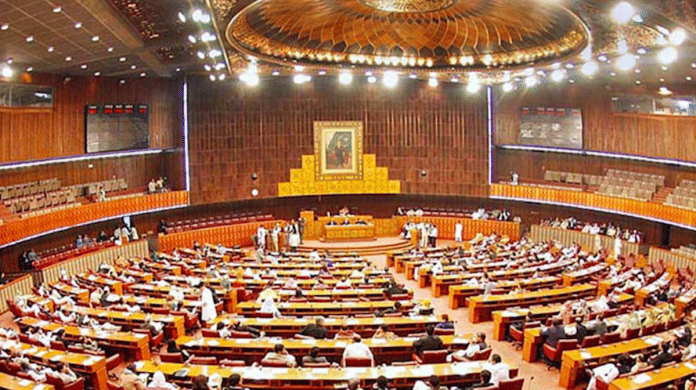New Delhi: Pakistanis can now be arrested or even fined millions of rupees for posting views that do not align with the government’s stance. It’s Big Brother magnified, and citizens are up in arms against this digital suppression of free speech.
Pakistan’s parliament passed a Bill on Thursday night to amend the already controversial Prevention of Electronic Crimes Act (PECA), 2016 on Thursday. The bill was introduced Wednesday and was passed within 24 hours by the National Assembly in an unusual display of urgency—despite a walkout by opposition leaders and journalists.
“We are reaching a point where we are unable to count the number of times the expression ‘yet another attempt’ has been used for the state’s efforts to restrict freedom of speech and undermine the right to privacy in Pakistan,” Usama Khilji, director of Bolo Bhi, an advocacy forum for digital rights, wrote in Dawn.
The amendments grant the government sweeping powers to regulate social media. Penalties include up to three years in prison and a fine of up to Rs 2o lakh for spreading fake news. The Bill also prohibits sharing statements from banned organisations or their members, and broadens the definition of social media platforms to include any online information management systems.
Journalists and digital rights activists have widely condemned the amendments.
“These amendments make the law [PECA] even more draconian by expanding the executive’s capture over the Internet—and over the discourse on it—both through criminal penalties and a licensing and takedown regime,” Farieha Aziz, co-founder of Bolo Bhi, told ThePrint.
The Amendment Bill bans the streaming of parliamentary proceedings. It also includes provisions to create a Digital Rights Protection Authority (DRPA) with the power to remove online content it deems unlawful. Social media platforms are required to register with DRPA, and those failing to comply could face temporary or permanent bans.
The Bill broadens the definition of illegal content, covering material that promotes violence, hatred, defamation, or harms national security. While these categories seem innocent enough, journalists have expressed concerns that the vague language in the Bill could be used by the state to censor critical reporting, particularly on government actions.
“The state is afraid of the power of social media and thus needs to devise protections from it,” said technology and human rights lawyer Omer Malik. “A telltale sign of this is how they have retained the power to block any online material which will have ‘aspersions against members of the judiciary, armed forces, parliament or provincial assembly’.”
Also read: Pakistanis are embarrassed seeing politicians fight over Imran Khan on TV
‘Tool for censorship’
Journalist organisations, digital rights activists, and newspaper editorials strongly condemned the amendments. The common refrain is that this is an “attack on freedom of expression”, a “digital dragnet” that will legalise “Big Brother”.
“The Pakistani state must stop inflicting wounds on itself and learn to resolve its internal issues through social and political means,” Dawn wrote in its editorial.
The Joint Action Committee (JAC), a coalition of journalists’ rights groups including the Pakistan Federal Union of Journalists (PFUJ) and the All Pakistan Newspapers Society (APNS), issued a joint statement denouncing the changes.
Others highlighted how the PECA had been used in the past to unfairly target journalists who have even been sentenced to death under this law.
“This bill raises further concerns over threats to press freedom, online privacy and democratic discourse—particularly on digital platforms. Rather than ensuring online safety, it risks becoming another tool for censorship and authoritarianism under the pretext of cyber security,” The Standard noted in its editorial.
(Edited by Prasanna Bachchhav)






